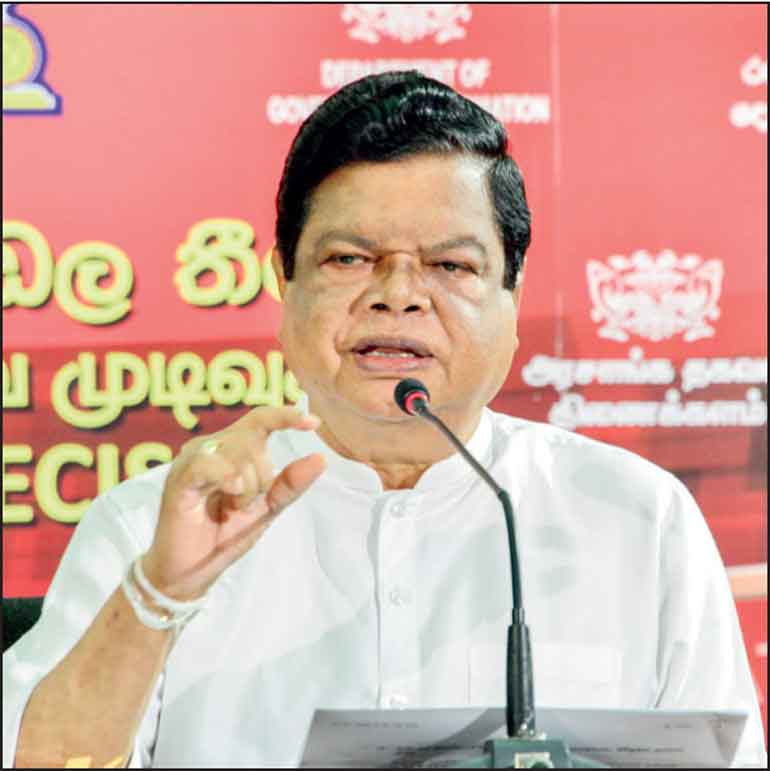Tuesday Feb 24, 2026
Tuesday Feb 24, 2026
Wednesday, 24 August 2022 00:00 - - {{hitsCtrl.values.hits}}

Cabinet Co-Spokesman and Minister Bandula Gunawardena gestures at the media briefing yesterday
By Charumini de Silva
The Government yesterday announced plans on an aggressive route to overcome the ongoing economic crisis, with a multi-step approach to boost revenue, cut down expenditure, and reform State-owned organisations via a medium term fiscal framework for 2023-2025.
“As per the fiscal framework, the State revenue should be increased from 9% to 11.3% of the GDP, whilst reducing the Government expenditure from 18.9% to 18.1% and narrowing down the budget deficit from 9.8% to 6.8% by next year,” Cabinet Co-Spokesman and Minister Bandula Gunawardena said at the post-Cabinet meeting media briefing yesterday.
This Cabinet decision on Budget 2023 was announced just ahead of the International Monetary Fund (IMF) mission visit today, where the Government is anticipating reaching a Staff-Level Agreement by the end of this month.
The proposal to this effect submitted by President Ranil Wickremesinghe, in his capacity as the Finance, Economic Stabilisation, and National Policies Minister was approved by the Cabinet of Ministers at its meeting on Monday.
Noting that Sri Lanka is facing the worst fiscal policy crisis in its history, Gunawardena stressed the importance of achieving the set targets in the fiscal framework, citing that those desired results were not achieved during the past decades by successive Governments.
“We need to maintain the budget deficit below 5% of the GDP at all times. Inability to service debts, incredibly high-interest rates, unbearable cost of living, and other difficulties faced by the economy are key reasons and direct repercussions of not sustaining the budget deficit on a globally accepted rate of around 5%,” he explained.
On Monday, the Department of Census and Statistics said the overall inflation rate as measured by the National Consumer Price Index (NCPI) on a year-on-year basis was at 66.7% as against 58.9% in June. The increase in July inflation was cited mainly due to higher price levels prevailing in both food and non-food groups, where YoY inflation of the food group rose to 82.5% in July from 75.8% in June and the inflation of the non-food group increased to 52.4% from 43.6%.
The Cabinet Co-Spokesman said it was also decided to prepare the estimates for 2023, adopting a ‘zero-based budgeting’ method, in which all expenses must be justified.
Outlining the Government’s need for increased revenue to overcome the worst economic crisis, he said certain priority areas such as reforming State-owned Enterprises (SOEs) were identified.
“Restructuring of loss-making State agencies, statutory bodies and corporations or closure of certain loss-making enterprises are some of the courses of action. If these or any other reformations are not applied in the immediate future, we cannot continue any economic activities in the country,” Gunawardena pointed out.
He also revealed that discussions were held to reconsider a voluntary retirement scheme (VRS) for employees attached to State-run media outlets.
The Cabinet Co-Spokesman said due to the dire financial state Government has not even been able to cover the basic expenditures of last year.
“Last year the tax income of the Government was only Rs. 1,268 billion, and of that Rs. 1,115 billion was spent to pay the State sector employees’ salaries and as pension. Only Rs. 153 billion remained for all the other development and welfare initiatives, whilst the interest for loans obtained was over Rs. 1,000 billion,” he added.
Experts have previously claimed that sharp tax cuts introduced by former President Gotabaya Rajapaksa-led Government in 2019 were responsible for the fiscal policy mismanagement, whilst the present administration is trying to take a U-turn to get back to the same tax framework which existed before December 2019.
When inquired about who is responsible for the ongoing economic crisis, Gunawardena explained it is the collective responsibility of everyone involved in fiscal management.
“Despite having the Fiscal Management (Responsibility) Act No. 3 of 2003, which underscores three key objectives; to ensure the budget deficit shall not exceed 5% of the GDP post-2006, maintain debt to GDP below 60% from 2013 onwards, and to maintain guarantee for loans only at 4.5% — successive Governments post-2004 have failed to adhere to it. As a result, today the budget deficit is at around 12%, debt to GDP at 119% and guarantee for loans at 15%,” he claimed.
He said arbitrary and stubborn decisions led to amend the 2003 Act three times and it was also a key reason for the current economic crisis.
“The bad fiscal management of successive Governments is the reason for the economic crisis today. The Parliament, Central Bank, and all parties involved in public financial management should be held accountable for this situation,” Gunawardena added.
